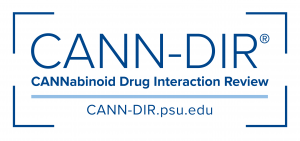Jump to topic
Search
CANN-DIR
Tool for Evaluating Potential Drug-Drug Interactions Based on Cannabinoids
 CANNabinoid Drug Interaction Review (CANN-DIR®), developed at Penn State College of Medicine, is intended to evaluate for potential drug-drug interactions based on the cannabinoids (THC and CBD) affecting the metabolism of other concomitantly prescribed medications. This tool has been developed for use by healthcare providers, patients, caregivers and interested community members.
CANNabinoid Drug Interaction Review (CANN-DIR®), developed at Penn State College of Medicine, is intended to evaluate for potential drug-drug interactions based on the cannabinoids (THC and CBD) affecting the metabolism of other concomitantly prescribed medications. This tool has been developed for use by healthcare providers, patients, caregivers and interested community members.
Cannabis Studies
Pharm 597 – Special Topics in Pharmacology: Cannabis-based Medicine
This course covers the endocannabinoid system and focuses on receptors targeted by cannabinoids. The emphasis is on the pharmacology of not only the major cannabinoids found in cannabis, tetrahydrocannabinol (THC) and cannabidiol (CBD), but will also cover minor cannabinoids, synthetic cannabinoids, and endocannabinoids (molecules produced by the body). The established therapeutic uses, potential therapeutic use, and negative effects will also be discussed.
Course Objectives:
- Gain knowledge of the components and function of the Endocannabinoid System
- Learn the major phytocannabinoids produced by Cannabis sativa L. and their potential and approved therapeutic uses
- Introduce the pharmacokinetics, metabolism and routes of administration for phytocannabinoids
This course will be part of a larger planned certificate program in medical cannabis.
